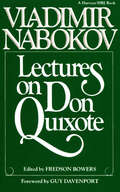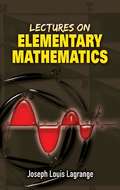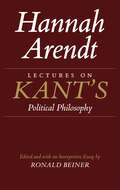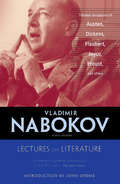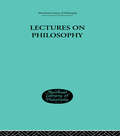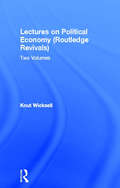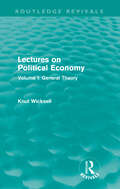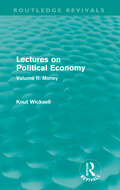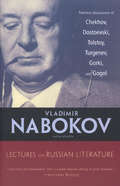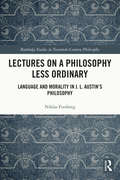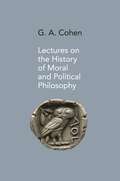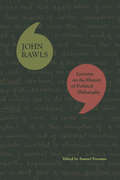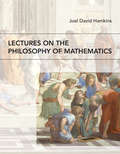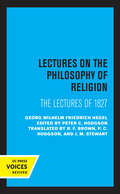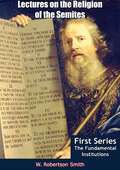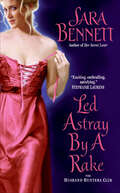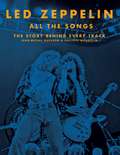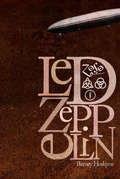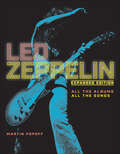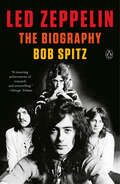- Table View
- List View
Lectures on Don Quixote
by Vladimir NabokovOne of the twentieth century&’s greatest novelists offers his take on the Spanish classic. The author of Lolita and Pale Fire was not only a master of fiction but a distinguished literary critic as well. In this collection of lectures, which he delivered at Harvard in the early 1950s, Vladimir Nabokov shares insights based on a chapter-by-chapter synopsis of the seventeenth-century novel by Miguel de Cervantes, a timeless classic and one of the most deeply influential works in all of Western literature. Rejecting the common interpretation of Don Quixote as a warm satire, Nabokov perceives the work as a catalog of cruelty through which the gaunt knight passes. Edited and with a preface by Fredson Bowers, this volume offers &“a powerful, critical, and dramatic elaboration of the theme of illusion&” (V. S. Pritchett, The New York Review of Books).
Lectures on Elementary Mathematics (Dover Books on Mathematics)
by Joseph Louis LagrangeOne of the eighteenth century's greatest mathematicians, Lagrange made significant contributions to all fields of analysis and number theory. He survived the French Revolution to deliver these lectures in 1795 at the École Normale, a training school for teachers. An exemplar among elementary expositions, Lagrange's talks feature both originality of thought and elegance of expression.The five lectures begin with discussions of arithmetic that focus on fractions and logarithms as well as theory and applications. Subsequent talks consider algebra, with emphasis on the resolution of equations of the third and fourth degree, the resolution of numerical equations, and the employment of curves in the solution of problems. Students, teachers, and others with an interest in mathematics will find this volume a unique reading book in mathematics, with fascinating historical and philosophical remarks by a distinguished mathematician.
Lectures on Kant's Political Philosophy
by Hannah Arendt edited by Ronald BeinerHannah Arendt's last philosophical work was an intended three-part project entitled The Life of the Mind. Unfortunately, Arendt lived to complete only the first two parts, Thinking and Willing. Of the third, Judging, only the title page, with epigraphs from Cato and Goethe, was found after her death. As the titles suggest, Arendt conceived of her work as roughly parallel to the three Critiques of Immanuel Kant. In fact, while she began work on The Life of the Mind, Arendt lectured on "Kant's Political Philosophy," using the Critique of Judgment as her main text. The present volume brings Arendt's notes for these lectures together with other of her texts on the topic of judging and provides important clues to the likely direction of Arendt's thinking in this area.
Lectures on Literature (Vib Ser. #Vol. 227)
by Vladimir NabokovThe acclaimed author of Lolita offers unique insight into works by James Joyce, Franz Kafka, Jane Austen, and others—with an introduction by John Updike. In the 1940s, when Vladimir Nabokov first embarked on his academic career in the United States, he brought with him hundreds of original lectures on the authors he most admired. For two decades those lectures served as the basis for Nabokov&’s teaching, first at Wellesley and then at Cornell, as he introduced undergraduates to the delights of great fiction. This volume collects Nabokov&’s famous lectures on Western European literature, with analysis and commentary on Charles Dickens&’s Bleak House, Gustav Flaubert&’s Madam Bovary, Marcel Proust&’s The Walk by Swann&’s Place, Robert Louis Stevenson&’s &“The Strange Case of Dr. Jekyll and Mr. Hyde,&” and other works. This volume also includes photographic reproductions of Nabokov&’s original notes, revealing his own edits, underlined passages, and more. Edited and with a Foreword by Fredson BowersIntroduction by John Updike
Lectures on Philosophy
by George Edward MooreThis is Volume XV in a collection of twenty-two on 20th Century Philosophy. First published in 1966, as a part of the Muirhead library of Philosophy this work consists of selections from three courses of lectures. The first course was given in the academic year 1925-26, the second in 1928-29, and the third in 1933-34. The first two (entitled “ Metaphysics” ) were intended primarily for Part II of the Moral Sciences Tripos; the last (entitled “ Elements of Philosophy” ) for Part I. (The selections from the second course, which are the most extensive, are printed first.)
Lectures on Political Economy: Two Volumes (Routledge Revivals: Lectures on Political Economy)
by Knut WicksellKnown as the "economist's economist" for his work on creating a synthetic economic theory, Swedish economist Knut Wicksell was a controversial, but highly influential figure in modern economic thought. His contributions to marginal productivity theory, income distribution and, most notably, his theory of interest would come to have a profound impact upon twentieth century economic theory, not least in the work of John Maynard Keynes. First published in English in 1934 and 1935, this Routledge Revival set is a reissue of Wicksell's two volume work on political economy, first published in Sweden in 1901 and 1906. This work is aimed at both the professional economist and the advanced student alike, as well as all those interested in the theoretical development of political economy. Volume I concerns itself predominantly with issues of theory: specifically the theory of value, the theory of production and distribution and the theory of capital accumulation. Volume II deals with theories relating to money, currency and credit.
Lectures on Political Economy: Volume I: General Theory (Routledge Revivals: Lectures on Political Economy)
by Knut WicksellFirst published in English in 1934, this Routledge Revival is a reissue of Volume I of Swedish economist Knut Wicksell's hugely influential work two volume work on political economy, a text which influenced a generation of economists. Concerned predominiantly with a mathematical treatment of issues of economic theory, the first volume deals specifically the theory of value, the theory of production and distribution and the theory of capital accumulation. Wicksell examines the origin of interest and offers a solution to the problem of distribution under capitalistic production, referencing the work of Eugen vom Böhm-Bawerk and Karl Gustav Cassel.
Lectures on Political Economy: Volume II: Money (Routledge Revivals: Lectures on Political Economy)
by Knut WicksellFirst published in English in 1935, this Routledge Revival is a reissue of Volume II of Knut Wicksell's Lectures on Political Economy. This volume deals with his contribution to macroeconomics, through an explication of economic theory and principle relating specifically to money, both in terms of functions and value, with a particular emphasis upon currency and credit. This volume also includes Wicksell's work on the quantity theory of money in which he first made the important distinction between the real rate of return on new capital (which he called the "natural rate of interest") and the actual market rate of interest.
Lectures on Religion
by Stephen J. Fleming John W. WelchLectures discussing the role religion played in the founding of America and its continued role up until the early 20th century
Lectures on Russian Literature
by Vladimir NabokovThe acclaimed author presents his unique insights into the works of great Russian authors including Tolstoy, Dostoevski, Gogol, Gorki, and Chekhov. In the 1940s, when Vladimir Nabokov first embarked on his academic career in the United States, he brought with him hundreds of original lectures on the authors he most admired. For two decades those lectures served as the basis for Nabokov&’s teaching, first at Wellesley and then at Cornell, as he introduced undergraduates to the delights of great fiction. This volume collects Nabokov&’s famous lectures on 19th century Russian literature, with analysis and commentary on Nikolay Gogol&’s Dead Souls and &“The Overcoat&”; Ivan Turgenev&’s Fathers and Sons; Maxim Gorki&’s &“On the Rafts&”; Leo Tolstoy&’s Anna Karenina and The Death of Ivan Ilych; two short stories and a play by Anton Chekhov; and several works by Fyodor Dostoevski, including Crime and Punishment, The Idiot, and The Possessed. This volume also includes Nabokov&’s lectures on the art of translation, the nature of Russian censorship, and other topics. Featured throughout the volume are photographic reproductions of Nabokov&’s original notes. &“This volume . . . never once fails to instruct and stimulate. This is a great Russian talking of great Russians.&” —Anthony Burgess Introduction by Fredson Bowers
Lectures on a Philosophy Less Ordinary: Language and Morality in J.L. Austin’s Philosophy (Routledge Studies in Twentieth-Century Philosophy)
by Niklas ForsbergThis book offers a comprehensive reinterpretation of J.L. Austin’s philosophy. It opens new ways of thinking about ethics and other contemporary issues in the wake of Austin’s philosophical work. Austin is primarily viewed as a philosopher of language whose work focused on the pragmatic aspects of speech. His work on ordinary language philosophy and speech act theory is seen as his main contribution to philosophy. This book challenges this received view to show that Austin used his most well-known theoretical notions as heuristic tools aimed at debunking the fact/value dichotomy. Additionally, it demonstrates that Austin’s continual returns to the ordinary is rooted in a desire to show that our lives in language are complicated and multifaceted. What emerges is an attempt to think with Austin about problems that are central to philosophy today—such as the question about linguistic inheritance, truth, the relationship between a language inherited and morality, and how we are to cope with linguistic elasticity and historicity. Lectures on a Philosophy Less Ordinary will appeal to scholars and advanced students working on Austin’s philosophy, philosophy of language, and the history of analytic philosophy.
Lectures on the History of Moral and Political Philosophy
by Jonathan Wolff G. A. CohenPreviously unpublished writings from one of the most important political philosophers of recent timesG. A. Cohen was one of the leading political philosophers of recent times. He first came to wide attention in 1978 with the prize-winning book Karl Marx's Theory of History: A Defence. In subsequent decades his published writings largely turned away from the history of philosophy, focusing instead on equality, freedom, and justice. However, throughout his career he regularly lectured on a wide range of moral and political philosophers of the past. This volume collects these previously unpublished lectures.Starting with a chapter centered on Plato, but also discussing the pre-Socratics as well as Aristotle, the book moves to social contract theory as discussed by Hobbes, Locke, and Hume, and then continues with chapters on Kant, Hegel, and Nietzsche. The book also contains some previously published but uncollected papers on Marx, Hobbes, and Kant, among other figures. The collection concludes with a memoir of Cohen written by the volume editor, Jonathan Wolff, who was a student of Cohen's.A hallmark of the lectures is Cohen's engagement with the thinkers he discusses. Rather than simply trying to render their thought accessible to the modern reader, he tests whether their arguments and positions are clear, sound, and free from contradiction. Throughout, he homes in on central issues and provides fresh approaches to the philosophers he examines. Ultimately, these lectures teach us not only about some of the great thinkers in the history of moral and political philosophy, but also about one of the great thinkers of our time: Cohen himself.
Lectures on the History of Political Philosophy
by John Rawls Samuel FreemanThis last book by the late John Rawls, derived from written lectures and notes for his long-running course on modern political philosophy, offers readers an account of the liberal political tradition from a scholar viewed by many as the greatest contemporary exponent of the philosophy behind that tradition. <p><p> Rawls's goal in the lectures was, he wrote, "to identify the more central features of liberalism as expressing a political conception of justice when liberalism is viewed from within the tradition of democratic constitutionalism." He does this by looking at several strands that make up the liberal and democratic constitutional traditions, and at the historical figures who best represent these strands--among them the contractarians Hobbes, Locke, and Rousseau; the utilitarians Hume, Sidgwick, and J. S. Mill; and Marx regarded as a critic of liberalism. Rawls's lectures on Bishop Joseph Butler also are included in an appendix. Constantly revised and refined over three decades, Rawls's lectures on these figures reflect his developing and changing views on the history of liberalism and democracy--as well as how he saw his own work in relation to those traditions. <p> With its clear and careful analyses of the doctrine of the social contract, utilitarianism, and socialism--and of their most influential proponents--this volume has a critical place in the traditions it expounds. Marked by Rawls's characteristic patience and curiosity, and scrupulously edited by his student and teaching assistant, Samuel Freeman, these lectures are a fitting final addition to his oeuvre, and to the history of political philosophy as well.
Lectures on the History of Political Philosophy
by John RawlsThis last book by the late John Rawls, derived from written lectures and notes for his long-running course on modern political philosophy, offers readers an account of the liberal political tradition from a scholar viewed by many as the greatest contemporary exponent of the philosophy behind that tradition. Rawls’s goal in the lectures was, he wrote, “to identify the more central features of liberalism as expressing a political conception of justice when liberalism is viewed from within the tradition of democratic constitutionalism.” He does this by looking at several strands that make up the liberal and democratic constitutional traditions, and at the historical figures who best represent these strands—among them the contractarians Hobbes, Locke, and Rousseau; the utilitarians Hume, Sidgwick, and J. S. Mill; and Marx regarded as a critic of liberalism. Rawls’s lectures on Bishop Joseph Butler also are included in an appendix. Constantly revised and refined over three decades, Rawls’s lectures on these figures reflect his developing and changing views on the history of liberalism and democracy—as well as how he saw his own work in relation to those traditions. With its clear and careful analyses of the doctrine of the social contract, utilitarianism, and socialism—and of their most influential proponents—this volume has a critical place in the traditions it expounds. Marked by Rawls’s characteristic patience and curiosity, and scrupulously edited by his student and teaching assistant, Samuel Freeman, these lectures are a fitting final addition to his oeuvre, and to the history of political philosophy as well.
Lectures on the Philosophy of Mathematics
by Joel David HamkinsAn introduction to the philosophy of mathematics grounded in mathematics and motivated by mathematical inquiry and practice.In this book, Joel David Hamkins offers an introduction to the philosophy of mathematics that is grounded in mathematics and motivated by mathematical inquiry and practice. He treats philosophical issues as they arise organically in mathematics, discussing such topics as platonism, realism, logicism, structuralism, formalism, infinity, and intuitionism in mathematical contexts. He organizes the book by mathematical themes--numbers, rigor, geometry, proof, computability, incompleteness, and set theory--that give rise again and again to philosophical considerations.
Lectures on the Philosophy of Religion: The Lectures of 1827
by Georg Wilhelm HegelThis title is part of UC Press's Voices Revived program, which commemorates University of California Press’s mission to seek out and cultivate the brightest minds and give them voice, reach, and impact. Drawing on a backlist dating to 1893, Voices Revived makes high-quality, peer-reviewed scholarship accessible once again using print-on-demand technology. This title was originally published in 1988.
Lectures on the Religion of the Semites - First Series: The Fundamental Institutions
by W. Robertson SmithScottish Semiticist and Arabist William Robertson Smith was a celebrated biblical critic, theorist of religion, and theorist of myth. His accomplishments were multiple. Smith's German mentors reconstructed the history of Israelite religion from the Bible itself; Smith ventured outside the Bible to Semitic religion and thereby pioneered the comparative study of religion. Where others viewed religion from the standpoint of the individual, Smith approached religion-at least ancient religion-from the standpoint of the group. He asserted that ancient religion was centrally a matter of practice, not creed, and singlehandedly created the ritualist theory of myth. Since Smith's time, the ritualist theory of myth has found adherents not only in biblical studies but in classics, anthropology, and literature as well. Smith's accomplishments are seen most fully in Religion of the Semites, adapted from a number of public lectures he gave at Aberdeen, and first published in 1889...Religion of the Semites combines extraordinary philological erudition with brilliant theorizing. Among the fundamental emphases of the book are the foci on sacrifice as the key ritual and non-ancient sacrifice as communion with God rather than as penance for sin. Most important is Smith's use of the comparative method: he uses cross-cultural examples from other "primitive peoples" to confirm his reconstruction from Semitic sources. Smith combines pioneering sociology and anthropology with a staunchly Christian faith. For him, Christianity is an expression of divine revelation. For Smith, only continuing revelation can account for the leap from the collective, ritualistic, and materialistic nature of ancient Semitic religion to the individualistic, creedal, and spiritualized nature of Christianity. Lectures on the Religion of the Semites manages to meld social science with theology, and remains a classic work in the social scientific study of religion.-Print ed.
Lecturing Women in British Fiction, Periodicals and Public Orality, 1870–1910: The First Speech (The Nineteenth Century Series)
by Anne-Julia ZwierleinThis book examines the emergence of women as audiences and speakers on the British metropolitan lecture circuit and in mass print representations from 1870 to 1910. Bringing together research on Victorian lecturing, periodicals, voice studies and the cultural history of feminism, it sheds new light on the interdependence of orality and print and the rise of the British women’s movement.Sifting through the archives of lecture institutions (the Birkbeck Literary and Scientific Institution, the London Institution and the Royal Institution), penny fiction weeklies and feminist weeklies, New Woman and suffrage novels, autobiographical writings and rhetorical manuals, this book reconstructs the changing mediascape of late Victorian London and treats speech events, in print and on site, as catalysts for democratic participation. Undertaking an archaeology of women’s presence in the lecture hall, it explores conservative fantasies in fiction of the female speaking automaton alongside new writings that transformed women orators from objects of sensation into public agents. By analysing women’s collective self-education in rhetoric and elocution, this book traces the emergence in political fictions of key narrative tropes of oral performance: the surprise encounter in the lecture hall, the moment of conversion during a lecture and the symbolic ‘first speech’ of new suffrage recruits.Drawing on new and extensive primary research, this book intervenes in several flourishing fields of inquiry: literary studies, oral culture studies, sound and voice studies, performance studies, periodical studies and Victorian and Edwardian cultural history.
Led Astray by a Rake: The Husband Hunters Club (The Husband Hunters Club Series #1)
by Sara BennettThe hunt is on for the perfect husband . . .Beneath Livy Monteith's icy blonde exterior beats a passionate heart, a heart that will not abide by society's rules. No, Livy will simply not marry the proper young man her parents have chosen for her husband. She'd rather die! But even her friends at Miss Debenham's Finishing School are shocked by the man she desires. Lord Dominic Lacey, the man they call Wicked Nic, is quite handsome, even more notorious, and every bit a scoundrel.Nic thinks he knows all about Livy. She's a proper young lady from an upstanding family, the kind of woman any respectable man would be thrilled to take as his bride—but Nic is not a respectable man. For Livy, even being seen with him would lead to certain scandal. So why is the ravishing innocent doing everything in her power to seduce him? Bedding her would be a delight. But a sinful night with a man like Nic would lead a girl very far astray indeed . . .
Led Zeppelin All the Songs: The Story Behind Every Track (All The Songs Ser.)
by Jean-Michel Guesdon Philippe MargotinTake a deep dive into the innovative recording history of Led Zeppelin, in this newest addition to the fan-favorite All the Songs series.Fifty years after their first practice in a Soho basement, Led Zeppelin continues to fascinate new generations of listeners. While their legendary back-stage debauchery has been written about extensively in other books, All the Songs is all about the music, detailing the studio magic and inspiration that made all nine albums go platinum, including Led Zeppelin IV which was certified x23 platinum and has sold more than 37 million copies worldwide. Studio stories will include their productive time at Headley Grange in Wales, a poorly-heated former poorhouse where they recorded parts of Led Zeppelin III, Led Zeppelin IV, Houses of the Holy and Physical Graffiti. And how the first album was recorded in three weeks but their second took six months, done while the band was on a world tour. They carried the masters of the recording session in a steamer trunk wherever they went. Out of these chaotic sessions came the "Whole Lotta Love," which was finished in New York with Hendrix engineer Eddie Kramer helping create the psychedelic middle part, as well as "The Lemon Song," which was cut live in the studio. Page worked feverishly with Kramer to mix the LP on a primitive 12-channel Altec board in a two-day span. Fans will also learn the genesis of their lyrics, the inspiration for their album covers, the instruments used, and the contributions of engineers such as Andy Johns, who helped create the iconic drum sound on "When the Levee Breaks" by recording Bonham at the bottom of a stairwell.
Led Zeppelin IV (Rock Of Ages Ser.)
by Barney HoskynsLed Zeppelin IV, often called heavy metal's greatest album, kicks off an exciting new series that takes a fresh, in-depth look at some of the greatest works from the most influential artists of the rock era. Fans may know the songs, but wait until they hear the stories behind them!The music contained in Led Zeppelin IV is part of the soundtrack to a generation. Released in 1971, it rocks, stomps, glides, and shimmers as it covers all the bases the band had mastered: heavy blues, barroom rock and roll, mandolin-driven folk, epic Tolkien-infused mysticism, acoustic Americana, and more. Certified gold one week after its release, the album went to #2 on the U.S. charts and #1 in the U.K. It remained on U.S. charts for 259 weeks. There probably isn't an aspiring rock guitarist anywhere who hasn't plucked out the notes and chords to "Stairway to Heaven" or "Black Dog," and yet many music lovers are unaware of the intriguing backstory to this genre-defining work.To this day there is confusion about what is the actual title of the album. And what about those mysterious symbols? Barney Hoskyns pierces those veils and more as he tells the fascinating story of the evocative set that cemented Led Zeppelin's standing as the biggest, baddest, loudest band in the world—and that remains today the apex of their art.
Led Zeppelin: All the Albums, All the Songs
by Martin PopoffThis expanded edition of Led Zeppelin: All the Albums, All the Songs breaks down one of the world’s most prolific bands—track by track, album by album.Formed by the unlikely alliance of two ace London studio musicians and two bar-band bumpkins from the north, Led Zeppelin went on to create the template for the modern marauding rock ‘n’ roll band. Though Zeppelin is often described as “heavy,” any true fan will tell you that the band’s catalog is actually a complex amalgam of blues, psychedelia, rock, folk, and country that reflect the specific influences carried by each of Led Zeppelin’s four members.Revised to include rarities, outtakes, and B-sides from their storied catalog, veteran music journalist Martin Popoff picks apart each of songs in exquisite detail, and, for the first time ever, he analyzes the circumstances that led to their creation, the recording processes, the historical contexts, and more.“Extraordinarily thorough descriptions and analysis of every track on Led Zeppelin’s nine original studio LPs.” —No Depression: The Journal of Roots Music“For the fan who’s about the music and not the B.S., All the Albums, All the Songs is the perfect book.” —The Current Rock & Roll Book Club“It’s a joy to rediscover such a familiar group through someone else’s (lively) ears, and the author is a charming guide with a real knack for description.” —Spectrum Culture
Led Zeppelin: The Biography
by Bob Spitz&“In this authoritative, unsparing history of the biggest rock group of the 1970s, Spitz delivers inside details and analysis with his well-known gift for storytelling.&” —PEOPLEFrom the author of the iconic, bestselling history of The Beatles, the definitive account of arguable the greatest rock band of all time.Rock star. Whatever that term means to you, chances are it owes a debt to Led Zeppelin. No one before or since has lived the dream quite like Jimmy Page, Robert Plant, John Paul Jones, and John Bonham. In Led Zeppelin, Bob Spitz takes their full measure, separating myth from reality with his trademark connoisseurship and storytelling flair.From the opening notes of their first album, the band announced itself as something different, a collision of grand artistic ambition and brute primal force, of English folk music and African American blues. Spitz&’s account of their artistic journey, amid the fascinating ecosystem of popular music, is irresistible. But the music is only part of the legend: Led Zeppelin is also the story of how the sixties became the seventies, of how innocence became decadence, of how rock took over. Led Zeppelin wasn&’t the first band to let loose on the road, but as with everything else, they took it to an entirely new level. Not all the legends are true, but in Spitz&’s careful accounting, what is true is astonishing and sometimes disturbing.Led Zeppelin gave no quarter, and neither has Bob Spitz. Led Zeppelin is the long-awaited full reckoning the band richly deserves.
Lee (With Photographs and Maps)
by Clifford DowdeyThe author presents a detailed account of the biography of Robert E. Lee and the Civil War.
